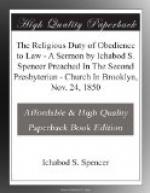This, therefore, settles the principle, on which obedience to human government is the religious duty of men. There may be a point where that obedience may justly stop, (a matter which we shall consider soon;) but the great principle before us now is an important one, namely, that human government and Law are things which exist by the will of God, and men are bound to submit to them on that high ground. This is the general rule. This is a religious duty; whatever exceptions we may be able to find sometimes, among the diversities of human Law and human condition under it,—or when human Law would interfere with the first class of our duties, which God does not allow it to do. “The powers that be, are ordained of God.”
Let it, therefore, be carefully noticed, that no man or body of men has any right to say, that they will be without government, without Law, or that religion has nothing to do with the question of their civil obedience to Law. Such obedience must be a part of their religion, or they cannot be Christians. It is a part of the will and ordinance of God.
Among politicians and statesmen, the idea of what they call “the social compact” is a very familiar idea, and sometimes figures largely. They mean by this, that there exists between the different members of every civilized and orderly community, a tacit “compact” or agreement, by which each individual tacitly or impliedly consents to surrender some of his natural rights into the hands of the community in general, or the hands of its government, in order to have the power of the community in general, or power of its government protect him in the enjoyment of others of his rights. Thus, they tell us, that each man receives a benefit from the power of society or government, which he could not secure by his individual power, and receives it in return for the individual natural rights, which he surrenders to the general society or government: so that, on the whole, this “compact” between him and the body politic is beneficial to him. For example, he might not be able to defend his farm from the violence of unjust men, who might deprive him of it; and so he procures the aid of civil government to defend it for him, and in return for this benefit he consents that his farm shall be taxed, and consents also to forego his personal right to defend it himself in any manner he could, and let the government defend it for him in their own way. So of all other civil provisions, rights and duties under the civil government. Politicians are accustomed to refer them all to “the social compact.”




